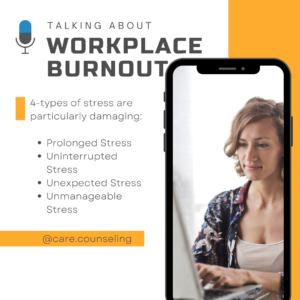 The number of people who recently quit their job within the last 3-months [August 2021] was estimated to be 20% higher than those who resigned in August 2019 and 40% higher than those who ended their jobs in August 2021. These numbers are unprecedented! If you were one of the 4.3 million people who recently quit, you are not alone.
The number of people who recently quit their job within the last 3-months [August 2021] was estimated to be 20% higher than those who resigned in August 2019 and 40% higher than those who ended their jobs in August 2021. These numbers are unprecedented! If you were one of the 4.3 million people who recently quit, you are not alone.
What is contributing to people leaving their jobs? One of the main things being reported is feeling burned out. The toll of the pandemic, social and economic hardship, racial unrest, illness, and death are too much, especially when experienced concurrently within a two year period.
While there are positive elements of stress, the following 4-types of stress are particularly damaging:
- Prolonged Stress
- Uninterrupted Stress
- Unexpected Stress
- Unmanageable Stress
These types of stress can then spill over to other areas of life, particularly within relationships. Ironically enough, one of the most stressful jobs identified by U.S. News at #5 is Marriage and Family Therapist. Similar roles within the top 25 include mental health counselor, clinical social worker, child & family social worker, and community mental health worker.
Taking the #1 spot is physicians. Other top stressful jobs in this category include anesthesiologist [#3] surgeon, physician assistant, and nurse practitioner.
IT manager and financial manager take the #2 and #4 spots, respectively.
While the top stressful-jobs tend to vary according to the sources, other top professions that make the list include workers in the retail/ sales management and the hospitality industry, chefs, teachers, lawyers, airline workers, compliance managers, business owners, public relations, construction workers, police officers, fire-fighters, emergency responders, and the military.
Here are questions to ask yourself that define aspects of the most stressful jobs:
- Am I personally responsible for the lives and personal safety of others?
- Am I exposed to potentially dangerous or life-threatening situations? What about high-conflict situations?
- Am I in a managerial role in which there are additional responsibilities and/ or pressure?
- Am I responsible for coordinating a large number of data/ tasks or responsible for my company’s systems/ technology?
- Does my job involve long-shifts? Think shift work, customer complaints, lack of breaks, and fast-faced environments.
- Am I away from my loved ones for prolonged periods of time, with no guarantee of a safe return?
If your job (or lack thereof) is currently taking an emotional toll on your mental health, you are feeling burnt out, possibly coping in maladaptive ways (e.g. substance use, social withdrawal) consider reaching out–being proactive with managing stress spillover before they cause more impairment with work, school, or relationships.
Therapy can specifically help with managing stress-spillover by helping you understand and manage stress. Interventions might include exploring emotions and relationships, using strategies such as cognitive behavioral interventions, and implementing balance and self-care into your daily routine. While we may logically know what is going to help, sometimes taking a break to experience emotions, connect, re-focus, and re-charge is needed. If you are not quite sure what you are looking for, give us a call and we can talk through options.
A special note to all the professional helpers .. help yourself before helping others. We look forward to meeting you
Written by Charlotte Johnson, MA, LPCC
We’re Here to help
Our wellness experts will be happy to take care of you. You can CLICK HERE to schedule an appointment now or call (612)223-8898.
Meet Clinicians
We’re united by our commitment to providing effective, relevant, and innovative mental health support at all stages of your journey. Click Here to find out more about who we are, where we come from, and how we live out CARE’s mission every day.
The professionals at CARE are actively collecting and creating resources to help with what you need. We’re Here for You.



